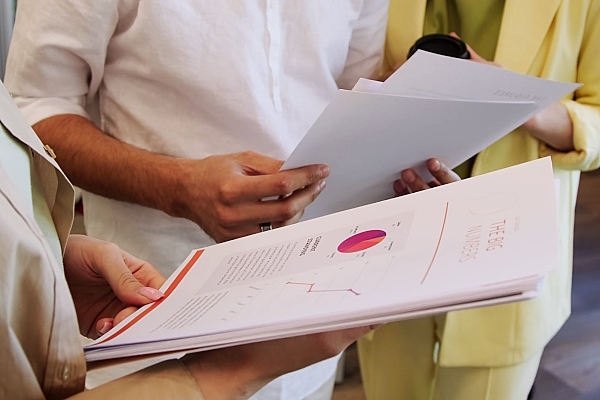After receiving the necessary documents and project presentation, our team will try to review your request as soon as possible, and leading experts will offer the best options for project funding.
It is important to understand that effective cooperation with capital providers is a key for the success of a business project.
Long-term financing terms and flexibility are critical for companies in the economic uncertainty of the post-crisis recovery.
If you are looking for professional investment services in Spain, GCAM Investment Group is ready to support large projects of any size.
We offer financing for the construction of factories, power plants, dams, roads, sewage treatment plants, commercial real estate and other capital intensive projects in Europe and beyond.
Development of investment companies and funds in Spain
Determining the origins of collective investment institutions is not easy.The idea of pooling funds from several investors and transferring them into the hands of specialized companies is not new. At the end of the Middle Ages, when there was a ban on usury, some merchant bankers successfully organized direct capital investments.
In the 17th century, local governments in the Netherlands acted as intermediaries between large trading companies that issued securities and potential investors.
In the next century, the first parish trusts appeared in the parishes of Scotland to pool the savings of the parishioners and invest them in profitable projects.
Several cases are mentioned in the first half of the 19th century, such as the Société des Actions Réunies, created by the Bank of Belgium shortly after the country's independence. A more recent example is the Scottish American Investment Fund (1873), which created fifty more investment companies with a combined capital of 115 million pounds before the eve of World War II.
Collective investment institutions (Instituciones de Inversión Colectiva, IIC) have existed in Spain for a long time, but only the 1952 Law laid down the formal rules for investment activities in this country.
The legal framework for CII from the moment the law was passed to the present has been based on efficient allocation of savings and protection of investors.
Financiers point out that the emergence and development of the market began in the 1980s. The development of the securities market, structured and regulated in accordance with international principles, has especially intensified with the adoption of the Securities Market Law 24/1988. An important milestone was the establishment of the National Securities Market Commission (Comisión Nacional del Mercado de Valores), which became the driving force behind the financial and investment services markets.
investment funds and companies are becoming more and more attractive to organizations and individuals who invest surplus funds in them.
Between 2012 and 2018, the ratio between investments in collective investment instruments and deposits by households and companies increased from 20% to more than 40%.
The striking changes in the role of the IIC in Spain can be largely attributed to the progressive modernization of the financial market and the expansion of investment opportunities. From 2013 until the beginning of the pandemic, there was a rapid growth in the assets of investment companies in Spain, which was explained by a decrease in interest on deposits, as well as favorable conditions for investing in financial markets.
On the other hand, the share of foreign investment companies and funds in the investment market is increasing.
The best results among the countries of the Economic and Monetary Union of the EU are shown by CII from Luxembourg, Ireland, Germany and France.
Spain ranked seventh in EMU with + 2% growth in investment fund capital (2019).
Between 2008 and 2019, the net worth of CIIs registered in Spain exceeded the country's nominal GDP, reflecting a significant improvement in investment conditions on the eve of the pandemic. households are the main shareholders of IIC with 80% share in 2019. At the same time, the assets of companies and organizations in collective investment institutions barely exceeded 20%.
Experts also note a tendency towards a reduction in the number of investment funds and companies with a simultaneous increase in assets. For example, the average capital of mutual funds in Spain has increased by almost 2.7 times over the past decade, reaching 168 million euros. These processes can be partially explained by the consolidation of the local banking sector.
Benefits of collective investment institutions for investors
Investment activity in Spain over the past decades has undergone significant quantitative and qualitative changes, accompanied by the transformation of the structure and principles of the activities of investment companies and funds.The so-called collective investment institutions, existing in the form of investment companies and investment funds, continue to play an important role in the financing of large projects in Spain.
Collective investment institutions in Spain are specialized financial institutions that raise funds, assets or investment rights and jointly invest them in financial or non-financial assets.
CII legislation is relatively young. Among the key legal acts are the Law on Collective Investment Institutions 35/2003, Royal Decree 1309/2005 amending the tax regime for collective investment institutions and a number of circulars from the National Securities Market Commission (CNMV).
CII as an innovative collective investment vehicle provides a number of potential benefits to the investor, including the following.

Table: Benefits of using collective investment institutions for private investors.
| Key benefits | Brief description |
| Professional asset management | Investment companies and funds guarantee investor comfort by entrusting asset management to professional financial markets specialists who have sufficient information to make effective decisions. |
| Collective investment safety | The credibility and safety of CII is mainly due to strict oversight by the National Securities Market Commission and prudent investment management practices. According to financial legislation, the concentration of risks is limited, so investments are usually diversified. An additional element of investor safety was the establishment in 2001 of the Guarantee Fund (Fondo de Garantía de Depósitos). |
| Return on investment | Collective investment institutions in Spain offer very attractive returns despite the investment of small amounts. |
| Liquidity of financial resources | It is easy for individuals and small companies to invest through investment companies and funds thanks to a well-developed mechanism for investment activities. |
| Minimization of agency costs | CIIs offer low operating costs, so collective investment institutions enter markets in a better environment than a private investor, which means they can operate with economies of scale. |
| Diversification of investments | Collective investment institutions allow investing in numerous assets and markets, starting with small amounts, which would be difficult for individual investors to do directly. At the same time, collective investment significantly reduces the risk. |
| Broad investment alternatives | The market offers investors a wide range of CIIs that are tailored to their needs, risk profile, and project specifics. Investment management is carried out from any country in the world under the guidance of professional analysts and managers. |
| Tax advantages | Since January 1, 2003, collective investment institutions have received a more favorable tax regime in comparison with other investment instruments. The innovation consists in the abolition of the so-called peaje fiscal, thanks to which the participants and partners of CII have increased their advantages. |
| Access to the information | Investment companies in Spain are obliged to provide their partners with up-to-date information on the evolution of their assets and all investments made. |
Classification of collective investment institutions in Spain
Apart from a general understanding of IICs as investment funds or investment companies in Spain, it is useful to know the specific types of institutions in order to assess their advantages and limitations in the context of local legislation.Prior to the adoption of the Law on Collective Investment Institutions in 2003, Spain had a simplified classification.

This classification must be taken into account, since the National Securities Market Commission still uses it partially for statistical reports.
Table: Old CII classification in Spain, which was valid until 2003.
| Collective investment institutions of a financial nature | Non-financial collective investment institutions |
| 1. Financial investment funds | 1. Non-financial investment funds |
| • Securities Investment Funds (Fondos de Inversión Mobiliaria, FIM) | • Real estate investment funds (Fondos de Inversión Inmobiliaria, FII) |
| • Money Market Asset Investment Funds (Fondos de Inversión en Activos del Mercado Monetario, FIAMM) | • Environmental investment funds and other funds that specialize in certain types of non-financial assets. |
| 2. Financial investment companies | 2. Non-financial investment companies |
| • Investment companies specializing in equity investment (Sociedades de inversión Mobiliaria de Capital Fijo, SIM) | • Investment companies specializing in real estate projects (Sociedades de Inversión Inmobiliaria, SII) |
| • Companies specializing in investing in real estate projects with variable capital (Sociedades de Inversión Mobiliaria de Capital Variable, SIMCAV) | |
| 3. Investment clubs of various profiles |
After the Law passed in 2003, collective investment institutions can be classified as follows.
This classification is relevant to the current financial legislation.
Table: Updated CII classification used after 2003.
| Collective investment institutions of a financial nature | Non-financial collective investment institutions |
| 1. Financial investment funds | 1. Non-financial investment funds |
| • Funds by sectors | • Real estate investment funds (Fondos de Inversión Inmobiliaria, FII) |
| • Listed investment funds | • Environmental investment funds and other funds that specialize in certain types of non-financial assets. |
| • Free investment funds | 2. Non-financial investment companies |
| • Money market funds | • Investment companies specializing in real estate projects (Sociedades de Inversión Inmobiliaria, SII) |
| 2. Financial investment companies | 3. Registered investment companies in the real estate market (Las Sociedades Cotizadas de Inversión en el Mercado Inmobiliaria, SOCIMI) |
| • Collective investment companies with variable capital (Sociedades de Inversión Colectiva de Capital Variable, SICAV) | |
| • Free investment companies | |
| • Companies by sectors | |
| 3. Financial investment clubs |
Regardless of the type CII, law imposes a number of strict requirements for the registration of investment companies and the licensing of their activities.

For example, official approval from CNMV is required for every investment institution.
In this case, the IIC must be incorporated as a limited liability company or investment fund and registered in the administrative register of the National Securities Market Commission. In the case of asset management companies, a permit from the Ministry of Economy on the submission of CNMV, registration in the Commercial Register and in the relevant register of CNMV will also be required.
Collective investment principles
The balance of risks and interests is achieved through professional diligence and providing investors with objective and up-to-date information.The effective regulation of the investment market in Spain has contributed to its prosperity.
Market participants should expect collective investment institutions in Spain to invest their assets in accordance with the following principles:
• Liquidity. CIIs must have a sufficiently high liquidity depending on the nature of the organization, the participants or the assets in which they are invested.
• Diversification of risk. Any investment company seeks to limit the concentration of risk by identifying the most suitable assets for investment.
• Transparency. CIIs must clearly define their investment policy, which is reflected in the information tools established by law.
Financial investment companies and funds in Spain can invest in the following financial assets or instruments listed below.
Firstly, these are negotiable securities and other financial instruments that are allowed for sale on the stock markets of Spain and European countries. Asset management companies and investment companies ensure that markets comply with legal requirements and must inform members of this.
Secondly, financial law has strict requirements for CII investment in securities.
They can also invest in shares and assets of entities permitted in the European Economic Community (EEC), provided that they do not invest more than 10% of their assets in other IICs.
Other securities and financial instruments limited to 10% of the capital of the investment company must be explicitly mentioned in booklet CII, for example:
• Shares and fixed income assets traded in foreign markets.
• Non-listed securities owned by OECD issuers that are not tax havens.
• Deposits in and foreign credit institutions.
• Shares of venture capital companies, etc.
CIIs invest in financial derivatives traded in organized markets with principles of operation and protection similar to those in Spain.
In the case of derivatives that are based on a financial index, they must be sufficiently diversified and widespread.
Collective investment institutions can acquire movable and immovable property for the development of activities, within 15% of the value of their assets.
CIIs of a financial nature must adhere to the principle of diversification and comply with numerous restrictions on the share and types of certain assets. Exceeding the established limits, regardless of the reason, must be resolved within 6 months.
How to choose the best investment company in Spain
When a business chooses methods and sources of financing for projects, the task comes down to finding the most attractive offer with an emphasis on future costs (cost of financing).There are several key aspects to consider and the following sequence to follow to make the right decision.
Three steps to choosing the optimal form of investment financing:
• Preparation of forecasts and comparison of alternative financial flows in all considered scenarios of financing an investment project.
• Calculating the total funding cost expressed as a percentage, for example, using an internal rate of return (IRR) formula.
• Selection of the cheapest form of financing and the optimal source.

If you are looking for a reliable investment company in Spain to finance a capital intensive project, please contact the GCAM finance team.
Our specialists have extensive knowledge and experience in international investment activities.
The recommended sequence of actions for managers includes the following steps:
1. Getting the best financial offers from investment companies on the market.
2. Comparative analysis of commissions and other conditions of each offer.
3. Forecasting additional costs that the company will incur when using a particular source of funding. Inclusion of sources in the overall forecast, taking into account unforeseen circumstances.
4. Financial forecast of the profitability of a new enterprise or investment project in the coming years. For large investment projects, a detailed and comprehensive business plan should be developed.
5. Choosing the best financing option for the project, taking into account IRR and other critical indicators. The last stage requires the involvement of experienced professionals in the fields of finance, law and international investment.
It can take a particularly long time to obtain information on the best sources available.
Spain offers a wide range of investment companies and funds from which you can choose products tailored to the needs of a particular investment project, industry or type of investment.
Usually the best results are obtained only by negotiations conducted directly with the funding party. List items 2-5 are not a problem for an experienced economist and can be completed in a short time. In case of significant investments, it is worth using the services of a consulting company.
In a situation where a company does not have free funds to implement an investment project, it must attract external financing.
If the investment project brings the company sufficient cash flow to service the debt, such a project will be successful.
Our experts recommend choosing an investment company in Spain with a high rating and a significant number of completed projects in the profile area.
We also believe that at the planning stage of a project, every entrepreneur should prepare a "safety cushion" to deal with temporary liquidity problems. This will guarantee the viability of the investment project in unforeseen conditions.
GCAM Investment Group facilitates the implementation of capital-intensive investment projects in Europe and beyond, providing long-term financing for up to 20 years.
We are ready to consider your projects in areas such as heavy industry, renewable energy, mining and processing of minerals, infrastructure, transportation, environment, real estate and tourism.
Contact us to learn more about the benefits of working with our company.




























